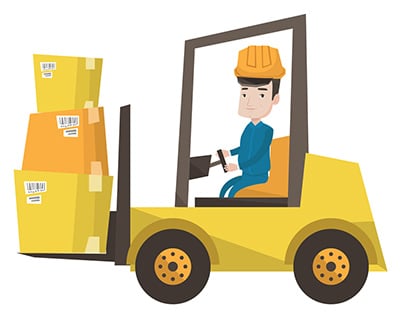Pre-Operational Requirements
 Regardless of an operator’s experience level, an optimum work environment, and impeccably maintained equipment, an operator cannot simply “jump on a forklift” and get working immediately.
Regardless of an operator’s experience level, an optimum work environment, and impeccably maintained equipment, an operator cannot simply “jump on a forklift” and get working immediately.
There are some extremely important pre-operational tasks that must be completed prior to operating the equipment.
Operators must be competent in this area, therefore, it’s a very important part of an operator’s practical evaluation.
Here are some pre-operation tasks that you’ll be evaluating:
Performs a Pre-use Inspection in Accordance with Company Guidelines
Because forklifts perform strenuous work and may operate in harsh environments, they can be prone to wear and tear, and even damage. This is one of the reasons that it’s important that companies establish a pre-use inspection process and procedure.
This process should require regular pre-use inspections that are conducted by the operators of the equipment.
When evaluating your operators, you should measure their performance against your company’s specific inspection criteria.
For example, you might have your maintenance department regularly inspect the engine compartment rather than having your operators do this. If this is the case, you should not deduct points from your operator if they do not check this area.
It’s likely that you have an actual inspection form for the operator to fill out. This would be an excellent reference to use when evaluating the operator since you’re measuring against the exact standard that your company uses for this task.

Correctly Completes the Required Inspection Documentation
As mentioned, it’s likely that the company has a documented inspection form that operator’s use for their pre-operational inspections.
You can ensure that the operator you’re evaluating completes this correctly by having them submit the document to you for your detailed review.
Reports Deficiencies in Accordance with Company Guidelines
There’s not much good in inspecting a piece of equipment if issues are never reported and resolved.
Unfortunately, in some companies, this becomes a common theme. Operators may identify issues with equipment and never report those issues, which results in them never getting resolved.
There are various reasons that this happens.
Sometimes, operators do report damage or deficiencies, but the damage does not get repaired in a timely manner. The operators become disheartened and feel that they’re reporting issues for no reason and that they’re not being heard.
When you’re evaluating your operator, in addition to ensuring that they report the deficiencies in accordance with the company’s guidelines, explain that they must do this consistently. Even if they feel that the repairs are not taking place quickly enough, let them know that they still must report the issues no matter what. There should also be an escalation process for these scenarios, and this is a good opportunity to reiterate the process.
Wears Required Personal Protective Equipment (PPE)
Depending on the type of forklift you’re evaluating the operator on, they may require some sort of PPE to carry out any pre-operational activities.
For example, if they’re inspecting the counterbalance of an extremely large forklift which requires you to be at a significant height, the operator may be required to wear some type of fall restraint system.
